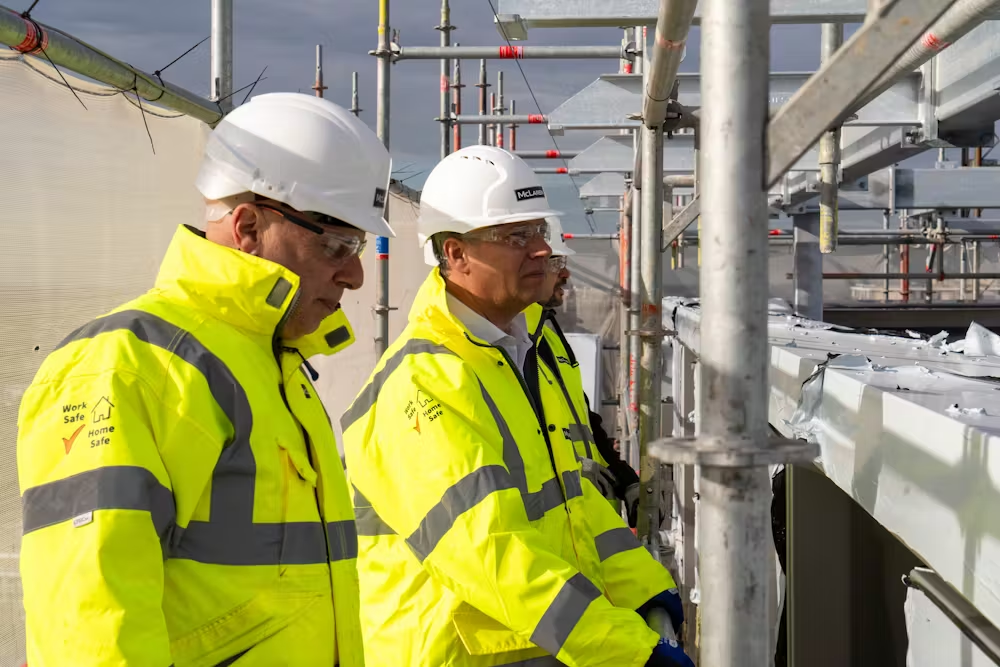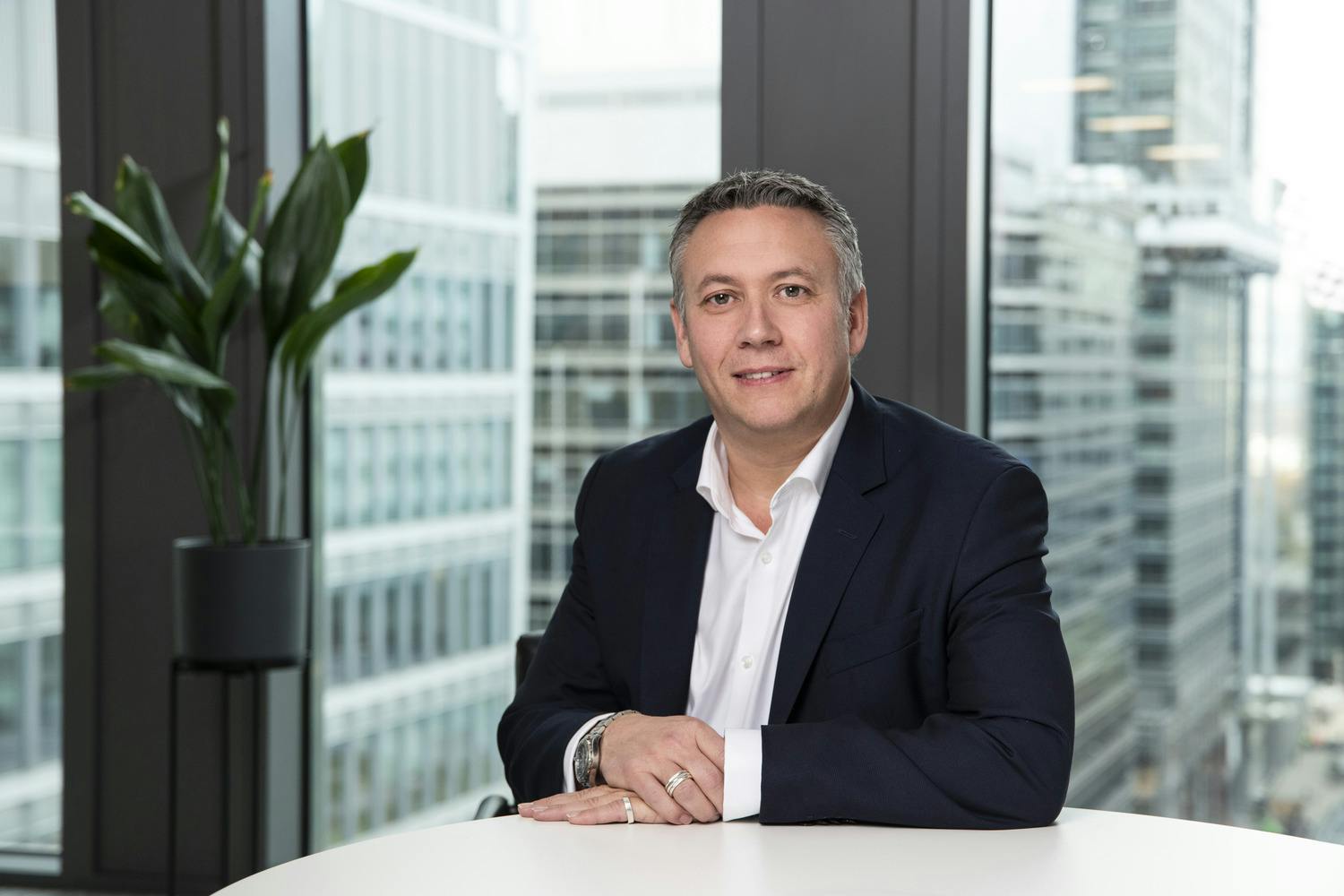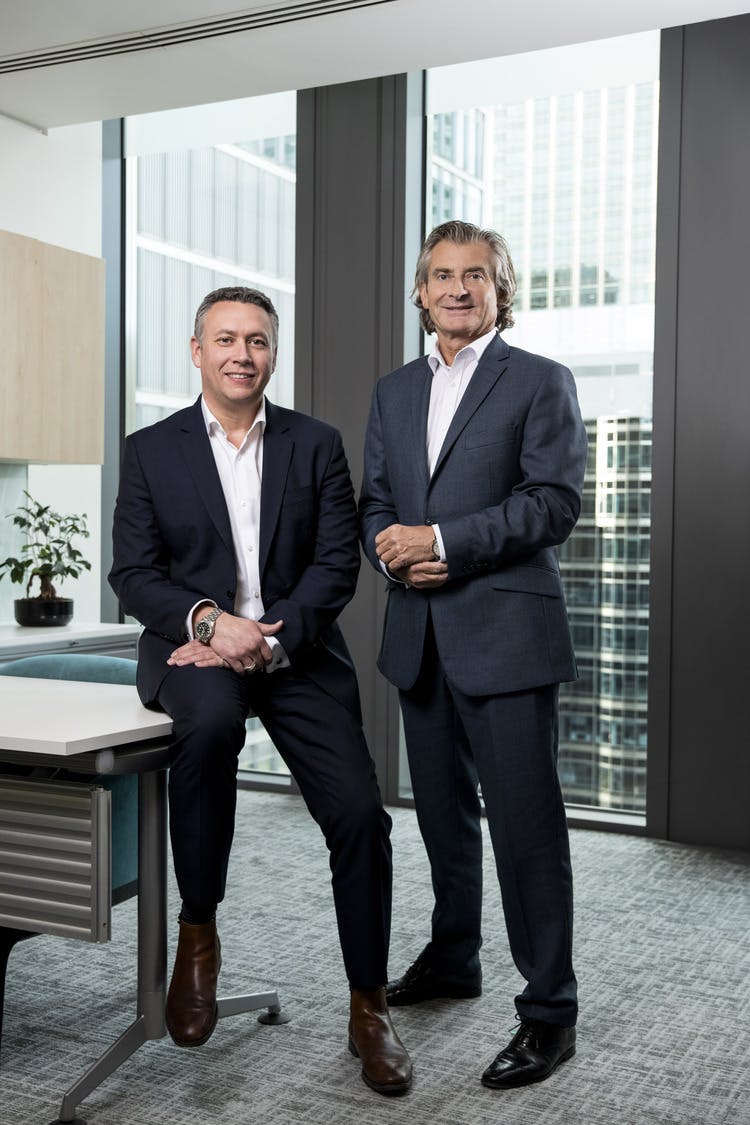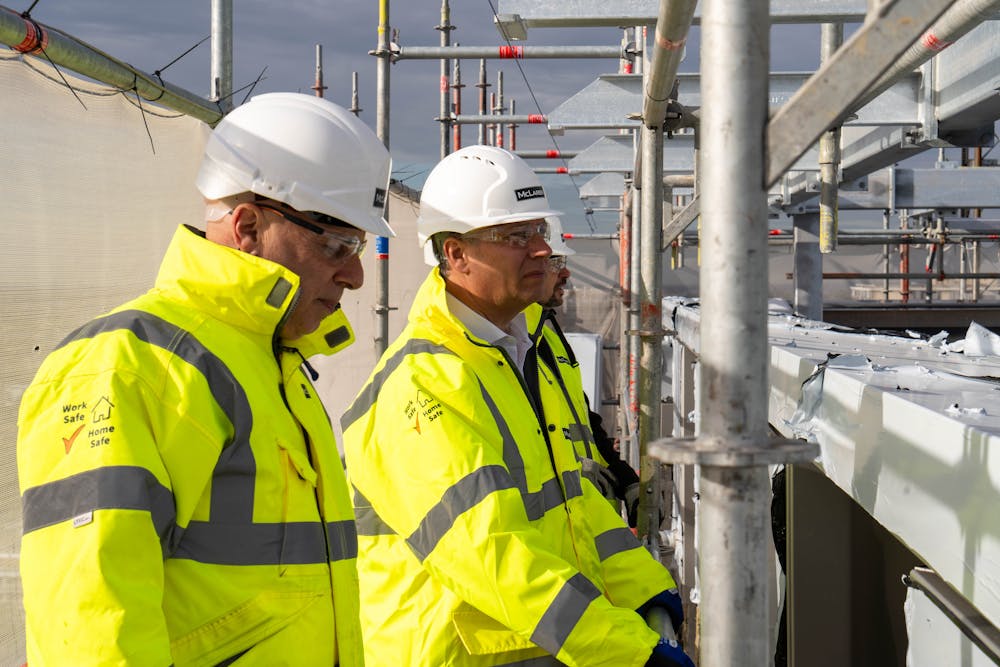McLaren's Paul Heather on Tier Ones And Being Headhunted on Holiday

Key points
From a teenager wondering what a QS does to running a £1bn business, the firm's construction boss talks to Dave Rogers about industry ups and downs - and being offered a job by Kevin Taylor.

Paul Heather has been at McLaren for two years this month, after being offered the job while at a friend's birthday bash in the Maldives.
Paul Heather can see the funny side when it is pointed out to him.
Happily ensconced at Skanska, where he was in charge of its London building business, with the Heron tower and The Gherkin among the notches on his CV, he was on holiday in Spain when a call from an unknown number came through.
"You're never out of reach now," he says, so he thought he had better answer it - just in case. It was a head-hunter.
The person at the other end of the line was sounding him out about a job. "I said, 'just tell me who it is, or it will be a very quick conversation'," Heather recalls.
The head-hunter stalled, adding that he couldn't and, even if he could, Heather would have to sign an NDA. ''l'm not signing an NDA, just tell me who it is or it's game over."
Heather admits that he would only have considered moving to one firm - Sir Robert McAlpine. "It's the industry name. "The head-hunter hummed and hawed before relenting. "He told me it was McAlpine. My first reaction was 'oh no'. It was a massive dilemma."
A few years later, in March 2022, he was on holiday again - in the Maldives for a friend's 50th birthday - and he got a call from McLaren co-owner Kevin Taylor. Heather had left McAlpine by now and the pair had been speaking on and off for a few months about a possible role at McLaren.

"We had met a few times, had some really good conversations. Then it all went a bit quiet," Heather says. "I thought it was a bit strange, and then he messaged me to say he might call me later in the week.
"He asked me where I was, and I said the Maldives. He called me on the Thursday and offered me the job and said, 'when are you back?' I said on Sunday. He said: 'Perfect, see you Monday.'
"I went, 'which Monday?' He said he meant this Monday and I said, ''but I don't land until Sunday'. And he replied: 'Yeah, but that's Sunday. See you Monday.'
"I came in on Monday and he said to me: 'Sorry to be in a bit of a rush but I had a board meeting and wanted to get a few things signed off and actually I go away on holiday tomorrow for three weeks.
"'That will be great for you - you don't need me. You can meet people, get around the projects and the regions.'"
The moral of the story would seem to be this: if he fancies a change of job, go on holiday. "Yeah, you're right," Heather laughs.
He joined McLaren as group managing director of its construction business. The 51-year-old moved to a group chief executive role last autumn.
The firm is set to go through a landmark turnover figure for the first time this year, when it files its next set of accounts which will cover the 12 months to July. "We will break the £1bn barrier this year - for what it's worth," Heather says.
He is not really bothered that McLaren, which has close to 1,000 staff, could now claim to be a tier 1 contractor. "What do people mean by tier 1 anymore? If you're seeing us as a go-to contractor with the right level of staffing and people that come with the ability to do it safely and sustainably, then we're right there."
McLaren, which is currently carrying out work to expand the ExCeL Centre in London's Docklands as well as turning the former Top Shop flagship on London's Oxford Street into an Ikea outlet, has seen its income jump from £586m in 2018 to £964m last year. "To bring the business from £500m/£600m to £1bn is a bit of change."
There is a lot more time and effort and thought going into getting cost efficiencies in the right place before a client is prepared to push the button on their scheme
Heather says he has never known things to be busier than they are now. ''A lot of people are running around doing a lot of things, but getting them on to the park is the hardest I've seen it.
"There is a lot more time and effort and thought going into getting cost efficiencies in the right place before a client is prepared to push the button on their scheme. That's definitely taking a lot more time."
Paul Heather CV
1990-1996: Trainee QS, Amec.
1996-1999: QS for Ruddy and freelance QS
1999-2017: Joins Kvaerner before firm's construction arm is bought by Skanska. In 2010, he becomes Skanska managing director for building in London and the South-east.
2017-2021: London managing director, Sir Robert McAlpine.
2022-present: Managing director and then chief executive of McLaren Construction.
He thinks the price points of schemes have hit the bottom now but is worried that the industry's reputation for a race to the bottom has not gone away. "We can be our worst enemy," he adds. "It's a tough time to make money."
Does he think that construction's historically low margins can ever be improved? His answer is not one for the optimists. "I don't think in my career I've ever seen it go above 3%. That's the industry we're in. If you get between 1% and 2%, that's considered upper quartile."
The only way he thinks that margins could get to 5% or 6% is for everyone to say that the minimum entry point is that figure and stick to it - "and no one break cover from that".
He concedes that is unlikely, but he adds: "If you do a good job, price it right at the start and make sure you haven't done anything silly at the end, then you will come out and make money. We are proud to be a builder. Money is made and lost on the projects."
Heather says the administrations which plague the industry hurt everyone. The firm's 2021 numbers were hit by concrete frame subcontractor O'Keefe going bust on a mixed-use scheme in Brighton.
"To Lose someone during construction is catastrophic," he says. "There is no benefit to our business to see an insolvency. If there is a feeling that someone is going to go into insolvency, then how do we work as an industry to make sure that doesn't happen?"
As well as managing years-Long structural issues, the industry is also having to deal with the Legislative changes brought in by the government in the wake of the Grenfell Tower fire nearly seven years ago. "We have to take it seriously, absolutely have to," he says of the Building Safety Act.
He thinks it will put clear water between those firms prepared to get up to speed and those who are slow to react. "It will allow for some competitiveness between those taking it seriously and those not taking it as seriously as they should."
It's a cost to the business, to put people through the training we're having to. We're putting a huge investment into learning and training and development.
McLaren is training up staff to meet the demands of the legislation. "It's a cost to the business, to put people through the training we're having to. We're putting a huge investment into learning and training and development."
Heather says the act will create different roles and bring in newcomers. "It will attract the PlayStation generation of staff to the industry that are becoming very important. There is a war on talent and we're seeing more and more staff coming into a business and asking: what's my future, what's my training, is it an inclusive environment? There is a lifestyle conversation, too, and they also want top dollar."
Heather's route into construction was rather different and probably strikes a chord with his generation. He was asked by a careers advisor what he wanted to do when he was 16. He said he had no idea, so he was asked what he liked.
"Football," came the teenager's reply. "She said: 'No, but what do you really like?' I said I quite liked maths and that my dad was a builder and she put it into her system and it came out with 'quantity surveyor'."
He had no idea what that was but liked the sound of it and so started at Amee, when it was still known as Fairclough Homes, in 1990. He ended up spending six years there.
"They had a great training scheme. I got to go through all the disciplines - QSing, planning, management, design, engineering. They were quite religious about it."
Heather left because work was drying up and, anyway, he needed more money and got a job with Ruddy. "I trebled my salary overnight which was incredible," he remembers.
He worked as a project QS on a scheme in London's City Road, eventually becoming a freelance QS for the client

But he was trying to buy a house and get a mortgage and, with the first of three children on the way, he needed a salaried role. So, in 1999, he joined Kvaerner, a Norwegian engineering and construction firm which sold its construction business to Swedish company Skanska the following year. There he stayed for 17 years.
"Skanska was really good. I see Skanska as my first employer, even though I did my training at Amee," he says. "I joined as number two QS on a scheme and Left as London managing director. We had to work hard to win a job. We didn't have the name of McAlpine or Laing but, when you won something, it was a great team effort."
Heather was recruited to McAlpine by Boyd McFee, then the firm's building boss who first joined McAlpine in 1976, and was brought in to head its London region. "We went from £450m to £950m in London," he says. "We were winning a Lot of work."
He came in as the firm's Bloomberg scheme was winding down and, all of sudden, "we had 260 people on Bloomberg with nowhere to go".
Most were eventually redeployed to phase three of the Battersea Power Station job, which Heather knew well from his days at Skanska when the firm was working on phase two before that job flipped to Mace. Other jobs during his time there included the Elizabeth Tower job and the 21 Moorfields City office scheme above Moorgate Tube station.
But, if McAlpine was the only firm he would consider leaving Skanska for, things did not quite work out. "It went a bit sour," he admits.
He left abruptly in August 2021 after what might be described as a management bust-up and, approaching 50, admitted to wondering if it was now curtains for his career?
"'Wow, what's left?' I thought. I was at that point in my Life and was thinking to myself, 'what do I do?"'
He got a call from Keltbray owner Brendan Kerr, an old friend, who asked him what he was doing.
"Sulking," I replied. "He said, 'don't do that, come and do some bits and pieces for me'." He helped to write Keltbray's business plan. "It was great for me, being back in that classroom environment."
Another head-hunter called and asked him if knew Kevin Taylor at McLaren. He had heard of him but didn't know him. They eventually met after a few false starts.
"He asked me what happened [at McAlpine] and he told me a few attempts to bring in senior people hadn't quite worked out for different reasons. We had some really good conversations. Kevin is a rollup-your-sleeves person and he will make decisions. He gets involved in the business, but [I have] that opportunity to be that one voice back to him."

Heather says his favourite job so far has been the Palestra building, the Will Alsop-designed office block opposite Southwark Tube station that Skanska completed in 2006 and which is the home of Transport for London. "It was a big one in terms of putting Skanska on the map. It gave me the springboard to move into a commercial director role."
And the greatest change has been the arrival of computers. "When I started, there was no computer on site, they were for the typing pool." He picks up his phone and wiggles it about. "I've had some amazing bosses, but they could escape. Now we're on call the whole time."
Earning his Spurs
Given their fierce rivalry, knowing that your boss - Kevin Taylor - is a West Ham fan must be difficult for Spurs-supporting Paul Heather. He says he doesn't mind West Ham, adding of this year's Premier League title race: "I'd be more frustrated if Chelsea won it over Arsenal. I want the London clubs to be winning. If they [Arsenal] do [this year], then great."
Heather grew up in Twickenham, which is not natural Spurs territory. "I was 10 years old. When you get to decide your football team, you either do what your dad [a Brentford fan] tells you or what your best mate does at the time. I went with my best mate."
The Tottenham team back then contained such players as Glenn Hoddle, captain Steve Perryman, Garth Crooks and the Argentinians Ossie Ardiles and Ricky Villa. A fine team, whatever your colours. Heather agrees, but sighs: "We haven't won anything for decades now."
McLaren moved to new premises in Canary Wharf -mention the Wharf and most of the stories are about firms heading the other way from the City last autumn. "I thought it was going to be a bit more of a problem because change upsets people, but actually everyone has settled in and being on one floorplate has made a big difference."
So, too, has the Elizabeth Line, which he uses to get into the City and West End. He comes in to London from Walton-on-Thames, where he Lives with his three daughters aged 21, 23 and 25. "It's a busy house," he admits.
Heather says the office at Churchill Place has room for about 220 people with around 170 in most days. Fridays are traditionally quieter but more and more are back in the office after covid, although it would seem not all for the reasons of close working relationships, social interaction and sharing ideas.
"I did hear someone say on the Tube the other day that they'd started to come into work more because it was cheaper."
This article was originally published by Building Magazine: ‘Perfect, see you Monday’ … McLaren’s Paul Heather on tier ones and being headhunted on holiday | Features | Building



